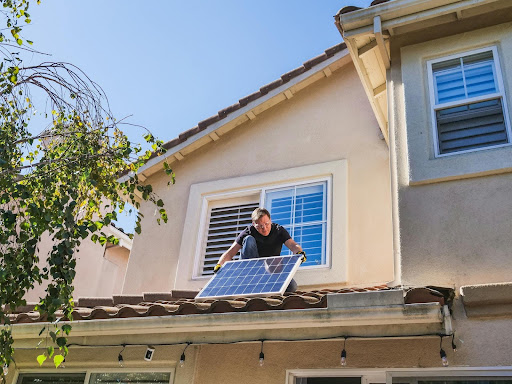Making your home more eco-friendly doesn’t have to be complicated. You can significantly reduce your environmental impact by incorporating a few practical changes and exploring innovative green technologies.
Whether through simple adjustments or more advanced upgrades, these strategies will help you create a healthier, more sustainable living space. Let’s explore how you can transform your home into a greener, more efficient haven.
Incorporating Renewable Energy and Technology
Incorporating renewable energy sources into your home is a fantastic way to reduce your carbon footprint and save on energy costs. Here are some of the most popular options to consider:
Solar Panels
Solar panels convert sunlight into electricity using photovoltaic cells, offering benefits like lower electricity bills, potential tax incentives, and reduced reliance on fossil fuels.
When considering home solar panels, assessing the initial installation cost, roof space availability, and how your local climate can optimize energy production is important. These factors can help you maximize the benefits and efficiency of solar energy in your home.
Wind Turbines
Wind turbines generate electricity by harnessing the power of the wind. They are ideal for rural areas with consistent wind and offer significant energy savings.
Factors to consider include zoning laws, noise levels, and the initial setup costs, all of which can help ensure that your wind turbine installation is efficient and effective for your energy needs.
Geothermal Systems
Geothermal systems utilize the earth’s stable underground temperature to heat and cool your home efficiently. They offer low operating costs and are an environmentally friendly option.
While they have a higher upfront cost, the long-term benefits can outweigh the investment. Additionally, suitable land for installation is important to maximize the system’s efficiency and effectiveness.
Biomass Heating Systems
Biomass heating systems generate heat by burning organic materials like wood pellets. They offer renewable and sustainable energy, can lower heating costs, and support local agriculture.
While they require storage space for fuel and regular maintenance, the benefits make them a compelling option for those seeking an eco-friendly heating solution.
| Double-Glazed Windows: Install double-glazed windows to help maintain your home’s temperature. It provides better insulation, reducing the need for excessive heating or cooling. |
Simple Ways to Make Your Home Eco-Friendly
Making your home more eco-friendly doesn’t have to be overwhelming or expensive. Here are some straightforward and impactful changes you can start with:
Reusable Bags and Containers
Replace single-use plastic bags and containers with reusable options. This reduces plastic waste and is a small step towards a more sustainable lifestyle.
Eco-Friendly Cleaning Products
Many conventional cleaning products contain harmful chemicals. Switching to eco-friendly alternatives can improve indoor air quality and reduce exposure to toxins.
Regular Pest Control
Pests can damage your home’s insulation, wiring, and structure, leading to increased energy usage and a higher carbon footprint due to necessary repairs. Regular home pest management helps you avoid costly repairs and maintain the overall efficiency of your eco-friendly home.
Reduced Water Waste
Simple actions like fixing leaky faucets, taking shorter showers, and using a broom instead of a hose to clean driveways can save significant water. Installing low-flow showerheads and faucets can also make a big difference.
Recycling and Composting
Set up a recycling system in your home to ensure that paper, plastic, glass, and metal are properly recycled. Composting organic waste like food scraps and yard clippings can reduce landfill waste and create nutrient-rich soil for your garden.
Sustainable Materials
When buying new furniture or renovating, opt for sustainably sourced materials from recycled content. Bamboo, reclaimed wood, and recycled metal are excellent choices.
Natural Light
Open curtains and blinds to maximize natural light during the day. This reduces the need for artificial lighting and can also help heat your home naturally in the winter.
Reducing Energy Consumption in Your Household
Reducing energy consumption in your household is great for the environment and helps you save on utility bills. Here are some effective strategies to get you started:
Insulate Your Home
Proper insulation keeps your home comfortable year-round by reducing the need for heating and cooling systems to work overtime. Fiberglass is affordable and easy to install, spray foam offers excellent coverage and air sealing, and cellulose, made from recycled paper, is an eco-friendly option.
Optimize Heating and Cooling Systems
Efficient HVAC use can greatly reduce energy consumption. Programmable thermostats save energy by lowering temperatures when you’re away, while regular maintenance, like monthly filter cleaning or replacement, ensures optimal system performance. Ceiling fans help circulate air, keeping your home cooler in summer and warmer in winter.
Energy-Efficient Appliances
Upgrading to energy-efficient appliances can make a significant impact. Look for the Energy Star label, which ensures appliances meet strict energy efficiency guidelines. Smart appliances can be programmed to run during off-peak hours, saving both energy and money.
Lighting
Switching to energy-efficient lighting is a simple way to cut energy consumption. LED bulbs use up to 75% less energy and last 25 times longer than incandescent bulbs. Smart lighting can enhance efficiency by automatically turning lights off when not in use or adjusting based on available natural light.
Seal Leaks
Air leaks waste a lot of energy, but they can be prevented with weatherstripping around doors and windows to stop drafts and caulking to seal gaps and cracks in walls, floors, and ceilings.
Energy Monitoring Devices
Energy monitoring devices help you track how and where you’re using energy. Smart meters provide real-time data on consumption, while professional energy audits can pinpoint areas for improvement.
A Greener Home is the Smart Choice
Transforming your home into a greener space benefits the environment, your health, and your wallet. You can create a more eco-friendly living space by making simple changes, investing in sustainable materials, incorporating renewable energy, and adopting innovative technologies.
These efforts will lead to long-term savings, improved well-being, and a positive environmental impact. Start your journey towards a greener home today and enjoy the numerous benefits it brings!
Keep an eye for more latest news & updates on Buzz Slash!




